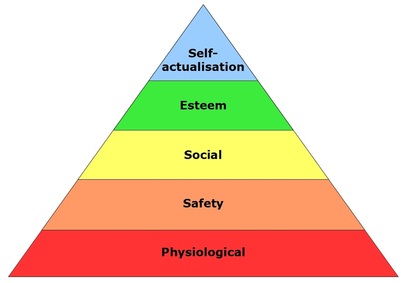|
Maslow's Hierarchy of Needs is a motivational theory developed by the American psychologist Abraham Maslow. It is one of the most widely discussed and referenced theories on motivation.
Maslow’s perspective is a wide-ranging overview of human motivation. It incorporates a blend of biological and environmental motives which represent the increasing complexity of human requirements. The theory is based on five hierarchical levels. Each level represents an increasingly complex set of human needs. The theory states that basic needs must be met, or at least partially met, before more advanced or evolved needs can be addressed. These needs are arranged in a pyramid form and indicate the varying strength and importance of each. The basic needs or requirements that are vital for daily survival form the bottom level of the pyramid and are the most important. The needs that are less important to survival or aren’t relevant to survival are higher up the pyramid. The following describes the five levels starting with the bottom of the pyramid, or level 1: Physiological. These needs are the literal requirements for human survival and form the largest and most important part of the hierarchy. Metabolic needs such as food, water and air as well as protective elements like clothing and shelter are all included in this level. If these most basic of needs aren’t met the hierarchy becomes obsolete as we cease to function.
1 Comment
Increasingly research is identifying that the expectations you have about specific behaviours (what you think you will get out of a behaviour) are what you should be focusing on if you want to make changes.
Often when we do things that we don’t really want to do e.g. overeating, not exercising, drinking etc., it's usually our self talk around expectations that are to blame. Take overeating for example. Expectancy prior to overeating might sound like… 'this (extra food) will make me feel good', 'I need more food', 'it will taste so good', etc. Typically what happens after overeating, assuming it was something you didn't want to do, is that the outcome will be the opposite of the initial expectations. In this case you might now be thinking, 'I feel bad/guilty/angry I ate that', 'I didn't actually need to eat that', and 'it didn't even taste that good'. Imagine that there was a pill that if taken daily would keep you healthy and slim. In addition this pill would allow you to live to 100 years old all the time experiencing a good quality of life. Would you take the pill? The answer for most would be… Yeah. Why not?
But here’s the catch. If you choose to take the pill you can never see your family again. Would you still take the pill? The answer for most or at least for a lot of people would be… No way! So what does this tell us? It tells us that despite knowing something is good for us, for example eating a healthy diet and getting regular exercise, there are always other things (barriers) that get in the way of doing them. Furthermore these barriers will often be valid and of significant importance in their own right for example, family, social life and money. So what do we do? |
AuthorMatt Williams Archives
December 2015
Categories
All
|
|
Exercise Change© 2011-2022 ● [email protected] ● 021 107 1270 ● (int) +64 21 107 1270
|



 RSS Feed
RSS Feed
